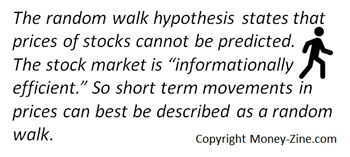Economists, scholars, and market analysts have been searching for ways to predict the movement of individual stocks for many years. Chartists and technical theorists believe historical patterns can be used to project future prices. While the random walk hypothesis claims that such movements cannot be accurately predicted. In this article, we're going to explain the principles behind the random walk theory. As part of that discussion, we'll start by comparing random walk to other popular theories such as the efficient market hypothesis, fundamental analysis, and technical analysis. Next, we'll talk about the modern history of this theory. Then we'll finish this topic with a brief discussion of the implications of this hypothesis.
Random Walk and Competing Theories
Generally, there are two competing approaches to predicting the movements of stocks: fundamental and technical analysis. In the sections below, we'll be taking a closer look at these competing theories, and how the random walk hypothesis aligns with each.
Fundamental Theorists
Fundamental analysts believe the price of a stock is a function of its intrinsic value, which depends heavily on the future earnings potential for a company. By carefully studying fundamental factors such as industry trends, economic news, and the company's earnings per share outlook, fundamental analyst can determine if the stock's price is above or below its intrinsic value. Comparing a stock's price to its intrinsic value allows the fundamental analyst to predict the potential future direction of the stock's price.
Technical Theorists
Market analysts that practice technical techniques believe that historical movements of a stock's price can be used to predict future price direction. Using methods such as charting, the technical analyst will examine the sequence of upward and downward movements for a stock. These patterns of movements allow the technical theorist to chart what they believe will be future movements for the stocks they are examining.
Efficient Market Theorists
The next theory we're going to talk about is the efficient market hypothesis (EMH). Subscribers to this theory believe the price of a stock reflects all publicly known information about a company. In fact, individuals subscribing to what is termed the "strong" EMH believe that stock prices also reflect what insiders know too.

Since public and private information concerning a company is instantly reflected in the market price of a stock, it's impossible for an investor to achieve "excess" returns. The principles of the random walk hypothesis are consistent with those of the efficient market hypothesis.
Random Walk
Finally, the random walk hypothesis states that prices of stocks cannot be predicted. The stock market is "informationally efficient." The people buying and selling stocks consist of a large number of rational investors with access to this information. While long term prices will reflect performance of the company over time, short term movements in prices can best be described as a random walk.
A Random Walk Down Wall Street
While the random walk hypothesis can trace its roots to 19th century mathematicians, today's theory can be attributed to Eugene F. Fama's doctoral dissertation, "The Behavior of Stock-Market Prices," published in the Journal of Business in January, 1965 along with the non-technical publication "Random Walks in Stock Market Prices." In 1973, Burton G. Malkiel of Princeton University followed up with the best-seller book "A Random Walk Down Wall Street." Since the random walk theory is based on an efficient market, historical patterns cannot be used to predict future movements in any kind of meaningful way. At any one point in time, the movement of a stock is random. The random walk hypothesis has been proven through a number of empirical studies. By examining real data, researchers such as Fama and Malkiel found there was no correlation between successive price changes. In other words, the next movement of a stock is completely independent of its prior movements. In fact, Malkiel would go on to state the movement of the stock market, as well as individual stocks, is just as random as flipping a coin.
Practical Implications
The random walk hypothesis has some practical implications to investors. For example, since the short term movement of a stock is random, there is no sense in worrying about timing the market. A buy and hold strategy will be just as effective as any attempt to time the purchase and sale of securities. When investors buy stocks, they usually do so because they believe the stock is worth more than they are paying. In the same way, investors sell stocks when they believe the stock is worth less than the selling price. If the efficient market theory and random walk hypothesis are true, then an investor's ability to outperform the stock market is more luck than analytical skill.
About the Author - Random Walk Theory Explained




.jpg)